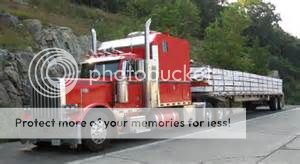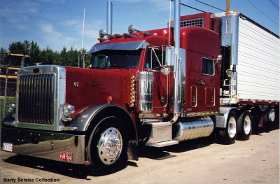CDL Schooling- Private Vs Public?
Topic 8410 | Page 1

Most companies do require a year experience and the number of companies that will hire recent school grads is limited. I was considering the company sponsored school route initially, but decided that I didn't want to end up "having" to stay with a company based on that. I opted to go to a vo-tech school. It is an 8 week course and the cost was less than $2900. I had a friend that went to Truck Driver Institute which was only 3 weeks, but the cost was $6k. I think more than twice the training for less than half the cost was a better choice for me. If you think you will be happy with a company that will train you, then by all means, go for it. You need to decide what will work best for you. That's what I did and this site is definitely a wealth of information in helping one decide. Good luck!
TWIC:
Transportation Worker Identification Credential
Truck drivers who regularly pick up from or deliver to the shipping ports will often be required to carry a TWIC card.
Your TWIC is a tamper-resistant biometric card which acts as both your identification in secure areas, as well as an indicator of you having passed the necessary security clearance. TWIC cards are valid for five years. The issuance of TWIC cards is overseen by the Transportation Security Administration and the Department of Homeland Security.
Hey red. I myself went with a private school for almost 6k. It wasn't much if a decision for me because I knew out of the gate I wanted to stay local. If you are planning on going with a company that offers the training than that seems like a no brainer. I think the main reasons you go private would be if you want more options to stay local. You can still do OTR too but if that's the direction going anyway than I say let someone else pick up the tab.
OTR:
Over The Road
OTR driving normally means you'll be hauling freight to various customers throughout your company's hauling region. It often entails being gone from home for two to three weeks at a time.

Heavy C You actually found a local job right out of school? I'm looking at training locally myself. Mainly for the convenience of it. I'm pretty sure that I will have to go otr for at least a year before getting a local job. It would be nice to stay local, though.
OTR:
Over The Road
OTR driving normally means you'll be hauling freight to various customers throughout your company's hauling region. It often entails being gone from home for two to three weeks at a time.
I did private school for a couple of reasons. 1. Class size. We had 5 in our class. Company training usually has a lot more. 2. The company I was most interested in (and ultimately hired me) doesn't offer CDL school/training but hires recent grads & does a 3 week orientation/training.
Even if you do private school most companies offer tuition reimbursement but it is a long payback period & you usually have to have graduated within 60-120 days.
I'm 50+ with no prior CDL experience. Good luck.
CDL:
Commercial Driver's License (CDL)
A CDL is required to drive any of the following vehicles:
- Any combination of vehicles with a gross combined weight rating (GCWR) of 26,001 or more pounds, providing the gross vehicle weight rating (GVWR) of the vehicle being towed is in excess of 10,000 pounds.
- Any single vehicle with a GVWR of 26,001 or more pounds, or any such vehicle towing another not in excess of 10,000 pounds.
- Any vehicle, regardless of size, designed to transport 16 or more persons, including the driver.
- Any vehicle required by federal regulations to be placarded while transporting hazardous materials.

I personally went down the route of company-sponsored training (CRST).
It's a 1.5% interest rate loan on ~$3.2k (so the interest itself after all said/done is under $100). I owe back ~$40/week, and have a 10-month contract. CRST sent me to a school near by home, 100% paid for the bus trip (100% free; Not a loan/advance/etc). The school itself provided breakfast, lunch, and $80 for yourself for dinner. It was a total of 3 weeks (although if you start with a permit: You're there 1 1/2 weeks).
Aside from issues with the trucks, and instructors at the specific school I went to: I was extremely happy with everything. The classroom instructors were awesome. The range instructor I was assigned to.. A real problem child (but it's okay). In the end: It ALL worked out for me, and I am glad about that. The orientation for CRST was pretty good. No wasted time honestly. Very professional, with a COUPLE of jokes from the Safety Director and that's it.
We're also supposed to submit a complete review of the CRST terminal , and all persons (1-5 rank, and comments). Putting our name is optional.
Terminal:
A facility where trucking companies operate out of, or their "home base" if you will. A lot of major companies have multiple terminals around the country which usually consist of the main office building, a drop lot for trailers, and sometimes a repair shop and wash facilities.
BMI:
Body mass index (BMI)
BMI is a formula that uses weight and height to estimate body fat. For most people, BMI provides a reasonable estimate of body fat. The BMI's biggest weakness is that it doesn't consider individual factors such as bone or muscle mass. BMI may:
- Underestimate body fat for older adults or other people with low muscle mass
- Overestimate body fat for people who are very muscular and physically fit
It's quite common, especially for men, to fall into the "overweight" category if you happen to be stronger than average. If you're pretty strong but in good shape then pay no attention.
Company-sponsored Training:
A Company-Sponsored Training Program is a school that is owned and operated by a trucking company.
The schooling often requires little or no money up front. Instead of paying up-front tuition you will sign an agreement to work for the company for a specified amount of time after graduation, usually around a year, at a slightly lower rate of pay in order to pay for the training.
If you choose to quit working for the company before your year is up, they will normally require you to pay back a prorated amount of money for the schooling. The amount you pay back will be comparable to what you would have paid if you went to an independently owned school.
Company-sponsored training can be an excellent way to get your career underway if you can't afford the tuition up front for private schooling.

I chose a private school for similar reasons to Steve L. I also preferred private because I was able to visit before hand and get a feel for what it would be like. That helped calm my jitters. Getting on a bus for 24 hours and then going to school in new state with no familiar surroundings sounded just a little too scary personally. The school I chose to attend also had good class size and does not charge extra if you go past 160 hours of instruction unless you fail three times and even then its a modest fee. Some students have been here 7+ weeks until they were fully ready to test out and they didn't pay any more than the original tuition. Company programs won't be that generous. (neither will most private schools so do your research). Finally I really wanted to learn the generic way to drive, not a specific companies methods. I figured this would make me a better driver candidate.
Since you already know about the High Road Training Program you shouldn't need to worry about the book material. So if you feel confident in your driving ability, and you expect to eventually drive for a company with a company school then it would sound like a company school is a good fit. But if you like a slower pace or just want to hedge your hiring bets a little more then private schools have a lot to offer as well. Just vet them carefully.
Also as a curiosity, what kind of events (corporate, concert, theater, catering?). For the past year I worked as a repair and lighting tech for a corporate event company.
CDL:
Commercial Driver's License (CDL)
A CDL is required to drive any of the following vehicles:
- Any combination of vehicles with a gross combined weight rating (GCWR) of 26,001 or more pounds, providing the gross vehicle weight rating (GVWR) of the vehicle being towed is in excess of 10,000 pounds.
- Any single vehicle with a GVWR of 26,001 or more pounds, or any such vehicle towing another not in excess of 10,000 pounds.
- Any vehicle, regardless of size, designed to transport 16 or more persons, including the driver.
- Any vehicle required by federal regulations to be placarded while transporting hazardous materials.
HOS:
Hours Of Service
HOS refers to the logbook hours of service regulations.Yes Rob I was able to stay local right out of school. Not only that but after I officially got my cdl I had four local interviews and three offers from those. The only reason I didn't get an offer from the fourth was because I needed a twic card which the manager couldn't wait for me to get cause it can take a while.
While it's not always feasible to get some of these jobs it is very possible. First thing you need to do is keep a close eye on your local job boards. If you see a place advertising a position for quite a while, they may be having a hard time filling it. Which means they may ease up on their restrictions so they can get someone in the seat. Make phone calls. Find out right from the horses mouth whether or not they would consider taking on a new driver. Sometimes they have no choice because insurance dictates who they can hire but it never hurts to find out. Also talk to your school and find out what local companies have hired directly from them before. If the company has had good luck with that schools students they very well take that into consideration. Lastly don't be afraid to apply. I literally applied to just about every driving job I could find. I didn't care if it required one year out three years experience. What's the worst they can say...No. But with applying make sure you're doing your follow up calling. You'll want to make sure they don't just shuffle your application to the bottom.
Just remember, local usually means more labor. Typically local jobs involve delivering product of some sort. if you're not afraid of some work then there could be plenty of opportunities out there. Also look into ltl companies like ODFL or YRC. These can be some of the best paying jobs in the industry and have been known to hire rookies. Just ask 6String 
CDL:
Commercial Driver's License (CDL)
A CDL is required to drive any of the following vehicles:
- Any combination of vehicles with a gross combined weight rating (GCWR) of 26,001 or more pounds, providing the gross vehicle weight rating (GVWR) of the vehicle being towed is in excess of 10,000 pounds.
- Any single vehicle with a GVWR of 26,001 or more pounds, or any such vehicle towing another not in excess of 10,000 pounds.
- Any vehicle, regardless of size, designed to transport 16 or more persons, including the driver.
- Any vehicle required by federal regulations to be placarded while transporting hazardous materials.
LTL:
Less Than Truckload
Refers to carriers that make a lot of smaller pickups and deliveries for multiple customers as opposed to hauling one big load of freight for one customer. This type of hauling is normally done by companies with terminals scattered throughout the country where freight is sorted before being moved on to its destination.
LTL carriers include:
- FedEx Freight
- Con-way
- YRC Freight
- UPS
- Old Dominion
- Estes
- Yellow-Roadway
- ABF Freight
- R+L Carrier
TWIC:
Transportation Worker Identification Credential
Truck drivers who regularly pick up from or deliver to the shipping ports will often be required to carry a TWIC card.
Your TWIC is a tamper-resistant biometric card which acts as both your identification in secure areas, as well as an indicator of you having passed the necessary security clearance. TWIC cards are valid for five years. The issuance of TWIC cards is overseen by the Transportation Security Administration and the Department of Homeland Security.
HOS:
Hours Of Service
HOS refers to the logbook hours of service regulations.
I just graduated Tidewater community college truck driving school in Portsmouth Va. The cost was a little over 2600 and the course was 8 weeks long.I had 12 people in my class and we had 8 trucks.The schooling was 5 days a week 7 hrs a day.After about 2 weeks of classroom the rest of the time was spent on the skill range doing backing and docking maneuvers and driving on the road.I averaged 3to 4 hrs of actual seat time every day. I highly recommend going the community college or votech route,you will get more seat time and better training.

I chose a private school for similar reasons to Steve L. I also preferred private because I was able to visit before hand and get a feel for what it would be like. That helped calm my jitters. Getting on a bus for 24 hours and then going to school in new state with no familiar surroundings sounded just a little too scary personally. The school I chose to attend also had good class size and does not charge extra if you go past 160 hours of instruction unless you fail three times and even then its a modest fee. Some students have been here 7+ weeks until they were fully ready to test out and they didn't pay any more than the original tuition. Company programs won't be that generous. (neither will most private schools so do your research). Finally I really wanted to learn the generic way to drive, not a specific companies methods. I figured this would make me a better driver candidate.
Since you already know about the High Road Training Program you shouldn't need to worry about the book material. So if you feel confident in your driving ability, and you expect to eventually drive for a company with a company school then it would sound like a company school is a good fit. But if you like a slower pace or just want to hedge your hiring bets a little more then private schools have a lot to offer as well. Just vet them carefully.
Also as a curiosity, what kind of events (corporate, concert, theater, catering?). For the past year I worked as a repair and lighting tech for a corporate event company.
Hi Brian,
Photography/Videography business. Lots and lots of wedding shooting...
CDL:
Commercial Driver's License (CDL)
A CDL is required to drive any of the following vehicles:
- Any combination of vehicles with a gross combined weight rating (GCWR) of 26,001 or more pounds, providing the gross vehicle weight rating (GVWR) of the vehicle being towed is in excess of 10,000 pounds.
- Any single vehicle with a GVWR of 26,001 or more pounds, or any such vehicle towing another not in excess of 10,000 pounds.
- Any vehicle, regardless of size, designed to transport 16 or more persons, including the driver.
- Any vehicle required by federal regulations to be placarded while transporting hazardous materials.
HOS:
Hours Of Service
HOS refers to the logbook hours of service regulations.New Reply:
New! Check out our help videos for a better understanding of our forum features

















Preview:








 TT On Facebook
TT On Facebook
I’ve been following this website/forum for quite a while. Self employed for 25+ years in the event industry, I’m looking for a job switch as I push 50. I started researching trucking job pros and cons and came across this site.
Of all the sites I’ve visited , this one is certainly the best- The study materials are very well done, and the participation by professional drivers in the forum is impressive. It’s great to see such excellent help from drivers taking time to offer advice after driving all day.
I’ve been studying the High Road materials online, but can’t make a job move until the end of the year due to business obligations.
Still, I have question regarding schooling, which I'm sure has been asked many times-
I’ve contemplated a local CDL school or company training. Local schools where I am offer only a few options, and if I get my CDL license privately, I’ll still need a year of OTR to be considered by most trucking companies for hire, no?
I know I’ve read versions of this question before, but for those that have gone the private school route, is it worth plunking down 5K+ for a CDL if I’m going to sign on with a company that offers company training, like a Prime etc?
thanks!
CDL:
Commercial Driver's License (CDL)
A CDL is required to drive any of the following vehicles:
OTR:
Over The Road
OTR driving normally means you'll be hauling freight to various customers throughout your company's hauling region. It often entails being gone from home for two to three weeks at a time.
HOS:
Hours Of Service
HOS refers to the logbook hours of service regulations.OWI:
Operating While Intoxicated